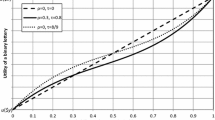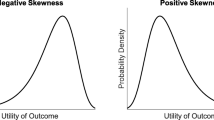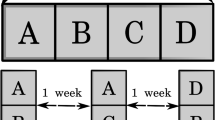Abstract
The central idea of Disappointment theory is that an individual forms an expectation about a risky alternative, and may experience disappointment if the outcome eventually obtained falls short of the expectation. We abandon the hypothesis of a well-defined prior expectation: disappointment feelings may arise from comparing the outcome received with anyof the gamble’s outcomes that the individual failed to get. This leads to a new, general form of Disappointment model. It encompasses Rank Dependent Utility with an explicit one-parameter probability transformation, and Risk-Value models with a generic risk measure including Variance, providing a unifying behavioral foundation for these models.
Similar content being viewed by others
References
Abdellaoui, Mohammed (2000). “Parameter-Free Elicitation of Utility and Probability Weighting Functions,” Management Science 46, 1497–1512.
Bell, David (1983). “Risk Premiums for Decision Regret,” Management Science 29(10), 1156–1166.
Bell, David (1985). “Disappointment in Decision Making under Uncertainty,” Operations Research 33, 1–27.
Bleichrodt, Han and José Luis Pinto (2000). “A Parameter-Free Elicitation of the Probability Weighting Function in Medical Decision Analysis,” Management Science 46, 1485–1496.
Delquié, Philippe and Alessandra Cillo (2006). “Expectations, Disappointment, and Rank-Dependent Probability Weighting,” Theory and Decision 60(2–3), 193–206.
Diecidue, Enrico and Peter Wakker (2001). “On the Intuition of Rank-Dependent Utility,” Journal of Risk and Uncertainty 23, 281–298.
Gul, Faruk (1991). “A Theory of Disappointment Aversion,” Econometrica 59, 667–686.
Jia, Jianmin and James S. Dyer (1996). “A Standard Measure of Risk and Risk-Value Models,” Management Science 45, 519–532.
Jia, Jianmin, Dyer, James S., and John C. Butler (2001). “Generalized Disappointment Models,”Journal of Risk and Uncertainty 22(1), 59–78.
Kahneman, Daniel and Amos Tversky (1979). “Prospect Theory: An Analysis of Decision under Risk,” Econometrica 47, 263–291.
Loomes, Graham and Robert Sugden (1986). “Disappointment and Dynamic Consistency in Choice under Uncertainty,” Review of Economic Studies 53, 271–282.
Machina, Mark J (1982). “Expected Utility Analysis Without the Independence Axiom,” Econometrica 50, 277–323.
Mellers, Barbara A., Alan Schwartz, Katty Ho, and Ilana Ritov (1997). “Decision Affect Theory: Emotional Reactions to the Outcomes of Risky Options,” Psychological Science 8(6), 423–429.
Ordóñez, Lisa D., Connolly, Terry, and Richard Coughlan (2000). “Multiple Reference Points in Satisfaction and Fairness Assessment,” Journal of Behavioral Decision Making 13(3), 329–344.
Quiggin, John (1982). “A Theory of Anticipated Utility,” Journal of Economic Behavior and Organization 3, 323–343.
Tversky, Amos and Daniel Kahneman (1992). “Advances in Prospect Theory: Cumulative Representation of Uncertainty,” Journal of Risk and Uncertainty 5, 297–323.
van Dijk, Wilco W., and Marcel Zeelenberg (2002). “What Do We Talk about When We Talk about Disappointment? Distinguishing Outcome-Related Disappointment from Person-Related Disappointment,” Cognition and Emotion 16(6), 787–807.
Wu, George and Richard Gonzalez (1996). “Curvature of the Probability Weighting Function,” Management Science 42, 1677–1690.
Author information
Authors and Affiliations
Corresponding author
Additional information
JEL Classification D80 . D81
Rights and permissions
About this article
Cite this article
Delquié, P., Cillo, A. Disappointment without prior expectation: a unifying perspective on decision under risk. J Risk Uncertainty 33, 197–215 (2006). https://doi.org/10.1007/s11166-006-0499-4
Issue Date:
DOI: https://doi.org/10.1007/s11166-006-0499-4




